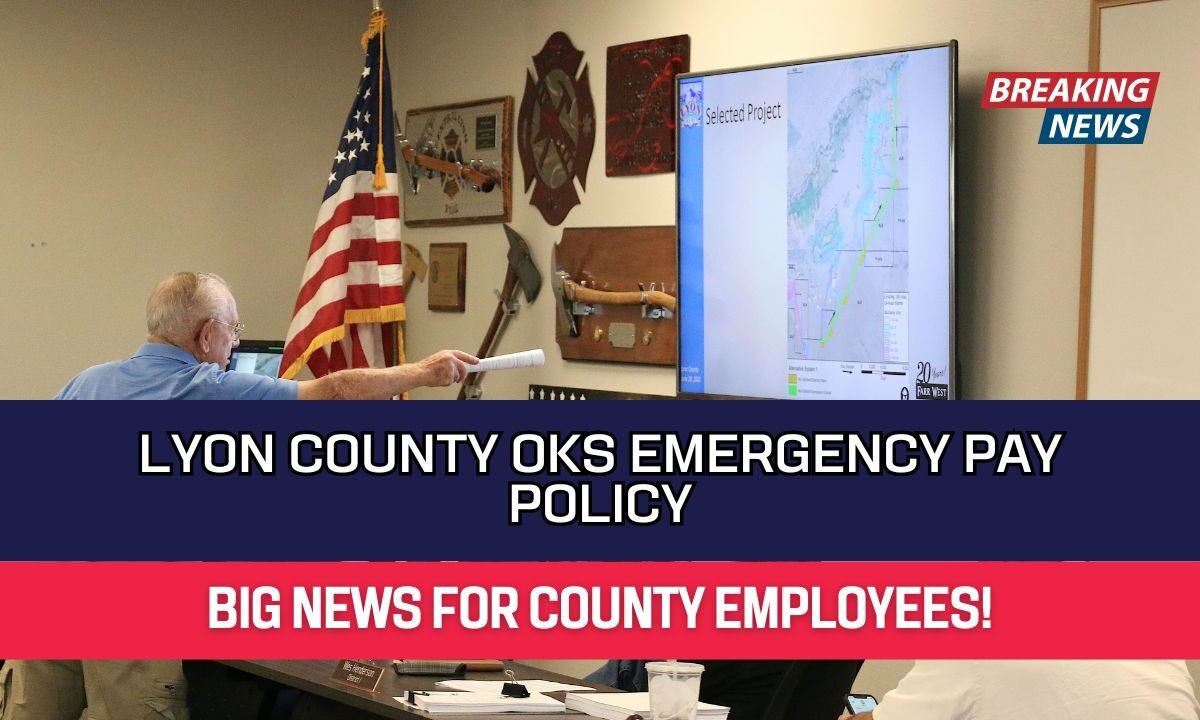The Lyon County Commission has approved a new premium pay policy to support exempt employees who work extra hours during emergencies.
This decision highlights the county’s goal to reward hard work and ensure that staff who go above and beyond in crisis situations receive fair compensation. The new policy also sets clear conditions on when and how employees can qualify for this special pay.
What Is the Premium Pay Policy?
The premium pay policy applies to exempt employees — those who are salaried and normally not eligible for overtime pay. Under the new rule, these employees will qualify for premium pay only if they work 60 or more hours in a single week during an emergency response.
This may include time spent working in Lyon County or assisting nearby counties during an officially declared emergency.
When the employee’s county declares an emergency, the policy activates automatically. If there is no local declaration, the Lyon County Commission will review and decide whether to approve premium pay for those employees.
Commissioners’ Views and Financial Concerns
Commissioner Doug Peck said the goal of this policy is to recognize the dedication of the county’s staff, emphasizing, “We want to take care of our employees. That’s the thought behind this.”
However, commissioners also discussed the possible financial impact of the policy. Since premium pay could lead to unbudgeted expenses, there were concerns about reimbursement timelines.
Officials noted that reimbursements could take up to two years, which means the county must ensure it has enough funds available to cover these payments in the meantime.
Despite these financial worries, the policy was quickly approved following the discussion.
Key Details of the Emergency Premium Pay Policy
| Criteria | Details |
|---|---|
| Eligibility | Exempt (salaried) employees working in emergencies |
| Required Work Hours | 60+ hours in one week |
| Activation Condition | Automatically during declared emergencies |
| Other Situations | Requires Commission approval |
| Purpose | To reward staff who work beyond regular duties |
| Expected Frequency of Use | Limited, based on emergency declarations |
Updates from CareArc: WIC Funding Challenges
Representatives from CareArc, including CEO Renee Hively, COO Amanda Dreasher, and Emergency Preparedness Coordinator Dennis Applegarth, presented their quarterly update to the commission.
A major concern raised was the uncertain future of federal funding for the Women, Infants, and Children (WIC) program, especially during the federal government shutdown.
Hively explained that CareArc is monitoring the situation daily, awaiting the November fund allocation from the state WIC department. Due to funding cuts and recruitment struggles, staffing shortages have grown.
She added, “The funding cuts have limited what we can pay staff. If you can’t pay them fairly, they won’t stay.”
The WIC program provides nutrition assistance to qualifying women, infants, and children, making it a crucial service that relies heavily on consistent funding.
LCAT Transportation Program and New Vehicle Plans
Shane Brunner from the Lyon County Area Transportation (LCAT) program discussed the Kansas Department of Transportation (KDOT) grant that helps fund the service. The grant covers 70% of operating costs and 80% of administrative costs.
For the 2027 fiscal year, the county approved its share of $295,379 to support the program.
Brunner also shared plans to purchase a new ramp-accessible minivan to replace an aging one. The state will cover most of the cost, and the county will contribute around $17,000 for its share.
Aerial Imaging Contract Renewal
The Lyon County Commission also renewed its contract with Eagleview, a GIS and aerial imagery company, approving a $47,294.14 annual payment.
Eagleview provides aerial maps and imagery that are widely used by public agencies and made available to the community. County officials also mentioned plans to share costs with other frequent users of these services to reduce future expenses.
The recent Lyon County Commission meeting showcased several key initiatives aimed at improving employee welfare, community programs, and technology services.
From approving premium pay for emergency staff to supporting WIC nutrition programs and local transportation, the county continues to focus on maintaining essential services while preparing for future challenges.
These decisions show a strong commitment to both employees and residents of Lyon County.




